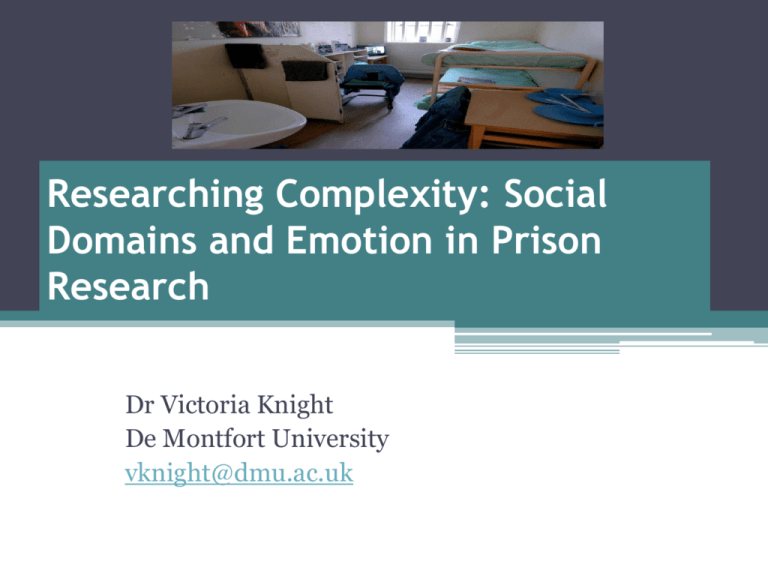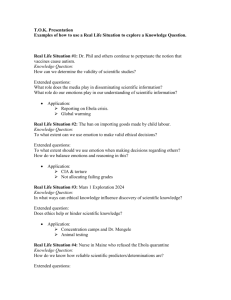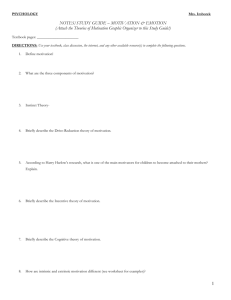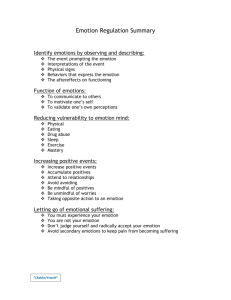View/Open - De Montfort University
advertisement

Researching Complexity: Social Domains and Emotion in Prison Research Dr Victoria Knight De Montfort University vknight@dmu.ac.uk Abstract This paper reflects on research which examined the impact of in-cell television on social relations in prison life in one closed male adult prison. An ethnographic research strategy was adopted and was directly informed by Layder’s (2005) theory of ‘domains’ and his ‘adaptive’ approach was used to interrogate the data from interviews and from diaries. Data collection was carried out using two methods: semi-structured interviews with nineteen prisoners and nine staff, and nine structured diaries completed by prisoners. This paper reflects on the value of Layder’s model for empirical exploration of emotions that appear in research. It will interrogate how domain theory and the adaptive approach can provide a valuable framework to develop conceptual links between the self, emotion and settings. Session: Researching Emotions Empirically My Aim & Objectives • Aim: To explore prisoners’ use of television Objectives: • To explore prisoners’ situated and mediated experiences of in-cell television • To reflect upon the ‘social uses’ of television in the context of incarceration • To reflect on the role that in-cell television plays in the prison regime • Contribute to television audience research methodologies in non-domestic settings The Study of Emotion ‘one of the problems in studying emotion is there seem to be so many aspects to experiencing emotion...especially when many aspects of emotional experience, such as cognition or embodied emotion, are often taken as in opposition...My solution is to view emotions as complexes...’ (Burkitt 2014:14) Ontological & Methodological Dead Ends? • Where were the ‘felt’ experiences of prison life/ watching television? • Discourse of pain in prison literature- typologies dominated the ways in which prison life is conceptualized- this ‘rationalized’ our understanding and thus affect is lost • Finding a way not to measure emotion- a qualitative view which celebrates the complexity of everyday life. Would I have interrogated emotion in the ways that I have without Layder’s Theory of Social Domains? A framework for social reality Layder’s view of social reality- ‘Social Domain Theory’ (2005) Contextual Resources Social Settings Situated Activity Psychobiography Some Insights into Social Domain Theory • Houston(2010)- ‘stratified world’, ‘depth and width’ (et al 2011) ‘wary of closure’ , ‘rich ontology’ ‘psychological depth and sociological width’ • Knight, C.(2012)- complexity of interpersonal control and how this manifests in work with offenders- domains as orientation • Besant & Francis (2005) – complexity and rigour ‘facilitates action research where there are several relevant interacting theoretical areas’ ‘theory development’ • Bunt (2013) –reach cognition and have dialogue with other theories Scaffolding- building a framework • Uses and Gratification models- psychobiography ▫ McQuail- uses and gratifications ▫ Lull (1980)- ‘social uses of television’ ▫ Jewkes (2001)- ‘meanings and motivations’ • Television and Everyday Life- situated activity ▫ Silverstone (1996) ▫ Moores (1993) • Audience ethnography- settings ▫ Moores ▫ Bird ▫ Silverstone et al • • • • • Emotion- Layder (2005), Hoschchild (1985) Civilised Elias () Garland ()- cultural resources Governance and therapy- Rose (1999)- cultural resources Pains of incarceration- Sykes (1958) Mood management and media use- psychological research An Adjoining Methodology :The Adaptive Approach (Layder 1998) • Middle range • Different to grounded theory ▫ Scaffolding ▫ Extant theory ▫ Avoids dualism and conflation • Social Domains • Methods & Analysis ▫ Triangulation ▫ Data Saturation- immediate analysis ▫ Sampling • Conceptualising and theory building • Quality and rigour • Writing and planning Application and Execution- 1 • Layder’s (1996) ‘adaptive approach’ • Moores- ethnography of audiences- capturing varying perspectives- the culture of TV in prison- (see also Hammersley and Atkinson 2010, Bird 2003, Jewkes 2002, Gray 1992, Silverstone et al 1991) • Knight (2001)- use of television diaries Application and Execution - 2 • Phased data collection 1. Consultation with prisoners and staff- how should I research this topic? 2. TV use diaries 3. Prisoner interviews- (some also completed diaries) 4. Key staff interviews • Phased analysis- Layder’s adaptive approach 1. Segmenting- open coding 2. Axial coding- finalising code book- intensified dialogue with extant theory 3. Concept-indicator links 4. Final concept development and elaboration 5. Basic quantification of diary data Managing Emotion in Qualitative Data Analysis Segmenting- Open Coding • What were prisoners doing with TV? • What were staff doing with TV? 1 Axial Coding- Code Book • Emotion codes • What do sociologists do with emotion? Concept-indicator Links • Extant theory- what others have said about emotion in these contexts • Patterns and relationships across data and participants Final Concept Development • Linkages & Clusters • Elaboration Deciphering Emotion in Data- Shaun’s feelings I don’t watch news, who wants to listen to news? I don’t care what’s going on out there, I just don’t care. I sometimes read a newspaper like [local], Inside Time is better for in here. Like the Michael Jackson death, it is a big thing in the media and on the front cover of the newspapers, so my girlfriend tells me. I am in a way disconnected and media still allows me to interact, or not as the case maybe at the minute. But I don’t care at present, as soon as you come through those gates the world has ended. Sensitizing Constructs- Telling the Story Bridging or binding concept = CONTROL• Making Room for In-cell TV- Contextual Resources & Social Setting ▫ Domestication of TV, entering the moral economy- Silverstone ▫ Impact on social relations- Spigel, Moores, O’Sullivan, Berker et al • Personal Control- TV, Emotion and Prison LifePsychobiography ▫ ▫ ▫ ▫ ‘protective device’ – Layder, ‘ontological security’ Silverstone Mood management- Zillman, Kubey Reach- Moores Dailiness- Scannell • Situated and Mediated Control- Governing Souls with InCell TV- Situated Activity ▫ Therapy and rationalization- Rose ▫ Civilizing effects- Silverstone, Elias, Moores ▫ Watching and surveillance- Lull, Rose Concept development of control: personal, inter-personal & technical • Control, as Layder (2004:17) suggests, is not devoid of emotion, and is a ‘constant companion to power’. • In the absence of formal routes to therapy, the expert comes to represent a form of psychic control as Rose (1999:144) argues: ‘a science of the soul [has] combined with a strategy for the government of the individual’. Interpretation and Discussion- 3 Concept: Control- Techno-therapy • Concept: Control- Techno-therapy TV as care-giver Control Managing emotion Linkages between codesclusters Looking after yourself Prison life IEP Staff- prison work Experts Therapy Time Staying connected to people Being in control Elaboration Self-regulation- (Rose 1991) Ontological security (Layder 2004; Silverstone 1996) Care and control (Rose 1991; Garland 1991) Contributing to Domain Theory Contextual Resources Social Settings Situated Activity Psychobiography Mediated Activity Emotion Would I have interrogated emotion in the ways that I have without Layder’s Theory of Social Domains? Opportunities • Break the constraints of a duality model of structure-agency • Avoids conflation or flattening out of duals • Multi disciplinarily • Multi strategies method • ...complex! Some References • • • • • • • • • • • • • Bessant, J. & Francis (2005) ‘Transferring Soft Technologies: Exploring Adaptive Theory, International journal of Technology Management and Sustainable Development, Vol. 4, (2) pp.93-112. Bunt, S. (2013) ‘A Framework for the Analysis of the Social Processes in the Adoption of Disabled Children’ Journal of Social Work, May, 13, 3. Burkitt, I. (2014) Emotions and Social Relations London, Sage Crewe, B., Warr, J., Bennett, P., & Smith, A. (2013). The emotional geography of prison life. Theoretical Criminology Houston, S. & Mullen-Jensen (2011), ‘Towards Depth and Width in Qualitative Social Work: Aligning Phenomenological Analysis with the Theory of Social Domains’ Qualitative Social Work, June Vol. 10. Knight, C. (2012) Soft Skills for Hard Work: An Explanation of the Efficacy of Emotional literacy of Practitioners working within the National Offender management Service with High risk Offenders. PhD. Thesis, DeMontfort University. Knight, V. (2012) Governing Souls with In-Cell Television: A study of the Role of In-Cell television in an adult Male prison In the UK. Ph.D thesis, De Montfort University. Layder, D. (2004) Emotion in Social Life: The Lost Heart of Society London, Sage Layder, D. (2005) Sociological Practice: Linking Theory and Social Research London, Sage Layder, D. (2006) Understanding Social Theory London, Sage Moores, S. (1993) Interpreting Audiences: The Ethnography of Media Consumption London, Sage Rose, N. (1999) Governing the Soul: The Shaping of the Private Self London, Routledge Silverstone, R. (1999) Television and Everyday Life London: Routledge






